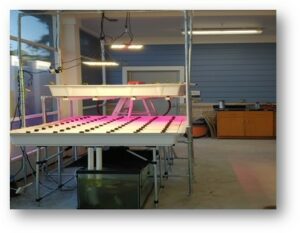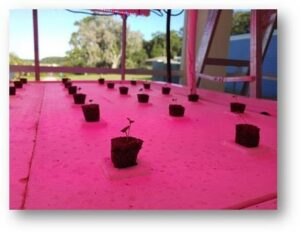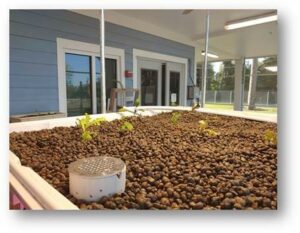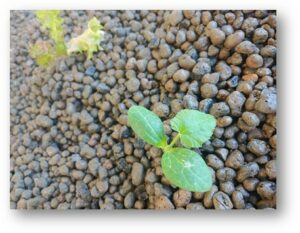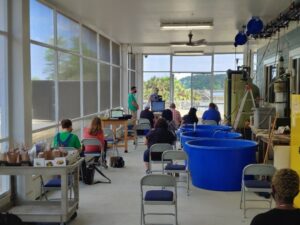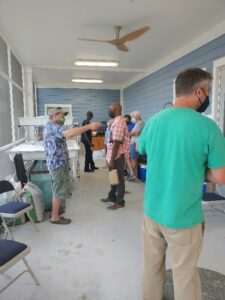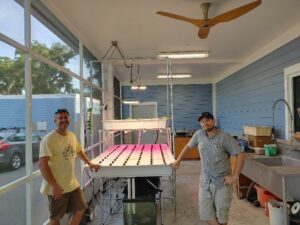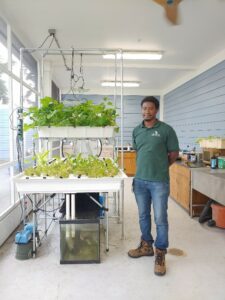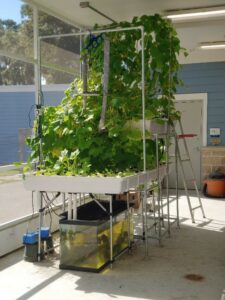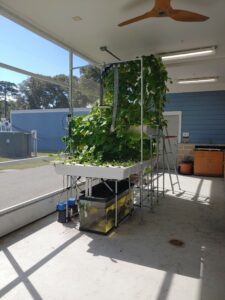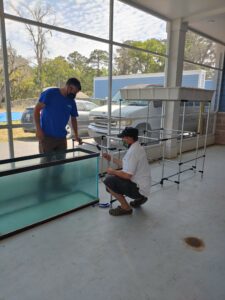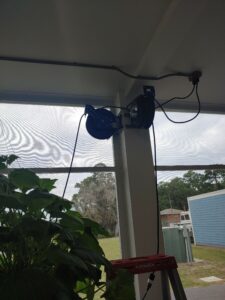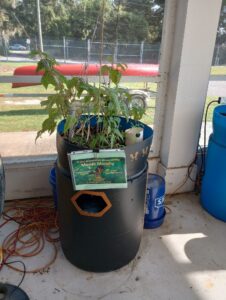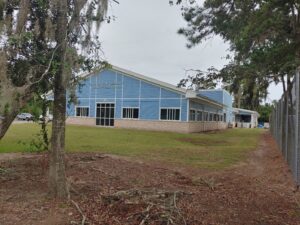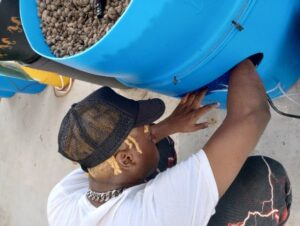Final report for EDS19-12
Project Information
A significant and growing area of world hunger is the availability/affordability of healthy food for urban and rural landless poor. In Savannah, the need is most pressing in areas described as urban food deserts (UFDs), which are lacking nearby grocery stores and often personal transportation. This obstacle creates scenarios of poor nutrition, food insecurity, and poor health outcomes. To achieve healthier, more equitable, and vibrant communities, it is essential to create opportunities for all residents to have practical access to healthy food. Simultaneously, our cities face challenges associated with management of vacant land and environmental degradation associated with nutrient-containing waste. We proposed an educational project to develop an agricultural system using urban aquaponics (synergistic fish and hydroponic vegetable farming) on city-owned, vacant land in a public-private partnership to address these challenges synergistically. Existing aquaponic farmers, academics, city leaders, and others were identified for a seminar series to create a path forward for this project while educating and recruiting interested new farmers. Also, an elementary school in a target UFD area was earmarked to host a demonstration system with accompanying curriculum.
Reduced access to health food is a problem created by urbanization. As cities have grown larger and denser, the practical travel time to food-growing areas has increased, eliminating the opportunity for residents to grow or obtain food directly. While industrial agricultural and retail grocers have solved this problem for most, certain areas in urban and rural areas have proven unprofitable for grocers and remain underserved. The fundamental solution is to shorten the distance to healthy, affordable food. While food pantry and food subsidy models have successfully met this need, they also require additional resource above that already invested.
The proposed approach focused to drastically reduce obstructive costs including land, transportation, retail, feed, and energy, and provide a more sustainable approach to address UFDs. This approach was envisioned to move beyond primarily education/recreational use of “community garden” space to truly fill a food gap through reduction of land and transportation costs by using vacant, city-owned urban land and feed costs reduction by recovering nutrient-rich urban wastes that are currently creating environmental problems.
Gadsden Elementary, the demonstration/education site and a Title One School of Distinction is located in an identified UFD and within an area selected by the city for the EPA CUPP program. As an emerging area of agriculture, there are regulatory, knowledge and acceptance hurdles to overcome before effective implementation. However, this educational step is essential to network critical entities and educate the public, existing and potential growers, administrators, and other stakeholders to the potential that this synergistic method has for increasing the sustainability of our urban and nearby rural communities.
- Procure data on preferences and demand for locally source produce and fish while fostering an environment in which key partnerships can be developed for production and distribution.
- Create opportunities for networking, training and exchange between existing producers and scientists centered around modern aquaponics, urban waste management, composting and vermiculture, urban food deserts, and business management with a legacy for continued partnership.
- Design and build a demonstration system in an elementary school in a Savannah UFD area to be used as an education and training tool with and by all invitees/participants/stakeholders, including UFD residents.
- Lay groundwork for a future grower-centered SARE research proposal to deploy and cultivate these concepts.
Cooperators
- - Producer (Educator and Researcher)
- - Producer (Educator and Researcher)
- (Educator)
Education
The seminar series was conducted in the Spring/Summer 2021 as follows:
Spring/Summer 2021
a. Modern Aquaponics Production
b. The Urban Agricultural Movement
c. Aquaponics and Urban Food Deserts
d. The Urban Farm Manager
e. Urban Land Availability, Access, and Security
f. Demonstration System and Curriculum Day
The themed modules were aligned with the major deliverables for the project: Survey analysis, production conceptualization, economic feasibility, regulatory action items, needed research areas, and grower implementation plan. Each module included an educational presentation from participating farmers, SSU faculty, or invited speakers, summarizing peer-reviewed literature and current best practices on topics in that module followed by discussions and networking on key plan elements. Each seminar participant was provided with a “producer pak” including materials from the presentation, and a complimentary book on the subject of that day's seminar. The participants were identified in collaboration with additional key stakeholders that included currently active growers with operations in or near Savannah (Billy's Botanicals, Savannah Hydroponics and Organics, and Savannah Urban Gardening Alliance/SUGA), a representative from the Savannah Office of Sustainability, a representative of Sustainable Aquaponics Research Center [SARC] Aquaculture program at the Armstrong Campus of Georgia Southern University, a representative from the hotel or restaurant industry with interest in local produce (contacts are available through Savannah Hydroponics and Organics; and “912 Truck” mobile food pantry service), Center for New Urbanism, Savannah Development and Renewal Authority, UGA Cooperative Extension Service, Metropolitan Planning Commission and our partners at Gadsden Elementary in the Savannah-Chatham County Public School System (SCCPSS).
The seminar series also planned to inventory available resources including potential locations for pilot sites on city land, legal issues or zoning changes that need to be made, and technical resources available from SARC. Savannah State University (SSU) engaged urban management, environmental science, and provided a unique opportunity to network underserved portions of the Savannah community and underrepresented populations in STEM education. Our partners at Gadsden Elementary in the Savannah-Chatham County Public School System (SCCPSS) had planned to upgrade their existing infrastructure to create active space for their teachers, working with our Education expert, Dr. Victoria Young, to identify science standards that can be addressed through the active learning platform/model relevant to this project. SCCPSS has already pledged their support and agreed to fund the demonstration system but this changed due to the impacts of COVID 19 pandemic. Additionally, we intended to pursue collaboration efforts with the SARC Aquaculture program at the Armstrong Campus of Georgia Southern University as a regionally relevant technical resource for the future research and implementation phases of the project.
Educational & Outreach Activities
Participation Summary:
We created topical working group seminar-discussion sessions of people from across the regional community and beyond Georgia as all of the sessions were offered in hybrid format. In-person participants were located on the porch at the SSU Marine Science Center (2717 Livingston Ave. Savannah, GA) and sessions were broadcasted through Zoom in an interactive format. Sessions held were:
Workshop Session Topics
| 1 | Urban Agriculture Working Group Kick Off |
| 2 | |
| 3 | The Urban Agriculture Movement |
| 4 | Aquaponics & Urban Food Deserts |
| 5 | The Science of Aquaponics |
| 6 | The Urban Farm Business |
| 7 | Urban Land Availability, Access, and Security |
"Final email message related to the summer 2021 sessions with our Growers (Gs), Those interested in Growing (TiGs), and Friends of Growers (FoGs) included pictures and idea from our final scheduled session, which July 2021:
-Partner with the Savannah Chatham Food Policy Council…Thank you, Nick and Larry, for the connection and suggestion!
-Hold a Barrel-ponics course in which you have the supplies and build the barrel system together…Thanks, Jerome!
-Work with the Chatham Savannah Authority for the Homeless to partner with their communities to get solar-powered aquaponics-based systems developed that work to meet their needs for fresh produce in downtown Savannah.
-Also, I had the chance to meet Ashley (spelling may not be right) who leads the Forsyth Farmers’ Market and there may be a way to work with them and the 912 Truck Program for providing fresh produce to the inner city areas.
Figures 1A-D: The seeds planted in the seed pods on last Sunday were up within 24 hours and the young plants planted in the grow bed are doing great!!!-See below".
With past recording and information accessible in the webspace that was created for the project: https://www.savannahstate.edu/cost/mar-env-science/marine-science/outreach/sare-page.shtml
Figures 2A-B: Training session in the Savannah State University Outdoor Learning Lab for our Sunday Working Groups on the Porch. This is one side of the space (L) and the other side, which also had chairs and houses the main demonstration system (R) [Summer 2021].
Figure 3: Experienced Growers, Andrew Morris (L) of Savannah Hydroponics & Organics and Billy Dugger (R) of Billy’s Botanicals after another hard day’s work on a Sunday of system construction and working group seminar session. This was also the starting day of the main demonstration system as it running and pods on rafts and gravel bed were fully planted and growing [July 2021].
Figure 4: Alumnus Kevin Blair visited one month after the system was set-up and growing [August 2021].
Figure 5A-B: After 3 months of growth [October 2021], they microsystem was going strong. In the spring, these fish spawned and we were able to keep two (2) of the offspring.
K-12 Education
Our target school was Gadsden Elementary K-5 education. During the grant period, Savannah State University formed a partnership with Georgia Aquarium. Georgia Aquarium levered funds from a Georgia Paper grant to provide a four-day training for the Gadsden Elementary teachers. This training provided classroom supplies, instruction on the biology and chemistry of the aquaponic system, and activity guides for the system. Savannah State University has been requested to return to the school to train a new cohort of instructors for the 2022-2023 academic year.
Due to the utilization at Gadsden Elementary, two new schools have expressed interest in including aquaponics systems in their classrooms. The first is a K-5 elementary school, A.B. Williams Elementary School. A.B. Williams school coordinated with Gadsden to identify the materials and resources needed to put two classroom aquaponics systems in the classroom. SSU supported these efforts helping set up the systems the school purchased after mentorship from Gadsden Elementary. SSU also provided some training and will follow up with the classrooms. A second school, Hubert Middle School has reached out to expand aquaponics in the classroom. The school served grades 6-8 and seeks to use aquaponics as a focus for problem-based learning. Dr. Young will follow up with the school to see what resources are available at the school to support the program.
Learning Outcomes
Forthcoming
Project Outcomes
Micro- and Mid-Scale Aquaponics
The demonstration systems (micro-scale and nano-scale) were constructed in collaboration with Dr. Philip Omunga, Billy’s Botanicals, and Savannah Hydroponics and Organics and with indirect cost recovery funds from Dr. Ebanks’ other funded projects. Figure 6A-C provide visuals during the third round of crops being harvested from the micro-scale tank in which nutrients were being produced by 10 tilapia of various species. GGT paid for the purchase of power cord reels and SSU paid for installation and testing.
Figure 6 (A): Micro-scale Aquaponics system that was represented as a schematic in the original Henry David Thoreau [HDT] proposal, was constructed in summer 2021 in partnership with Mr. Billy Dugger of Billy’s Botanicals and Mr. Andrew Morris of Savannah Hydroponics & Organics who were supported on SARE funds (pictured in B). (C) As part of match, SSU installed on existing generator-supported power, the power cord reels that were purchased through HDT funds.
Demonstration System within an Outdoor Learning Laboratory
Through leveraging funds from this project and gaining funds through competitive application to the Henry David Thoreau Foundation, we were able to develop and begin to activate an outdoor learning laboratory (OLL) space centered in urban growing to offer undergraduate research and outreach training in these areas. This was in lieu of and in assistance to K12 educators whose school systems were not yet allowing external personnel to enter school campuses. The outdoor learning lab has spaces for budding growers to test techniques in aquaponic, geological agriculture, urban trees, and urban traditional community gardens, as well as riparian buffer support. There are plans to add apiculture in the future. Additionally, an undergraduate level Special Topics course was developed and collaboratively taught with Experienced Growers that were introduced to the University because of this SARE-funded project. Growers Dugger and Morris co-taught sessions on barrel-ponics.
Figure 7: Barrel-ponics system constructed by a student, who was targeted as a potential grower during the Special Topics: Green Economies course in Spring semester 2022. The course was created using expertise introduced from this SARE project, existing University infrastructure resources, and the Outdoor Learning Laboratory. Picture taken September 2022
Figure 8: Savannah State University’s Marine Science Center. Site of the Outdoor Learning Laboratory (OLL). The space in the foreground is the future site of a pollinator garden and apiary, which will be helpful for education and outreach as well as pollination efforts in the OLL.
Progress continues for further development of the OLL for use in the course and continued viewing and use by visitors to DMES as well as for those interested in projects that are logical for work in the space. For example, a training session in 2022 that required participants to do water quality, was held on the porch and water collections were possible directly from the micro aquaponics system and participants had the option to also take water samples from the special nano-scale system for comparison. The nano-scale system was built during one of the Summer working group sessions and has served as a great nursery for the offspring from the micro-scale and barrel-ponics systems.
We anticipate activities such as these to substantially increase with the greater liberties recently being taken in K12 student and teacher activities compared to the start of the COVID-19 pandemic. The fully outdoor space, which also includes restroom facilities, continues to offer an option to smooth the transition from none to minimal numbers of visitors. Further, we have been able to use the harvest to support the on-campus Students That Are Rising (STAR) program by supply fresh produce to supplement the non-perishables that are accessible to the students in the pantry. This has been valuable because the SSU campus is located within an UFD.
Within the outdoor learning spaces at the MSC site and on-campus, the various culturing activities are making increasing headway.
Interns + Senior Research Students = Training aspiring growers
Work on this project provided support for a summer intern (2022) to be able to learn aquaponic systems during the summer along with interns that were accepted in the new Go Green Tigers program funded by The HDT Foundation. Training through the course and internships, and early work, have allowed these interns to be experienced workers in the OLL and have led to 2 senior research projects being conducted in aquaponics in Fall 2022.
Figure 9: One of two senior research students doing projects related to aquaponics. This student is preparing for a flood frequency experimental test. September 2022.
K12 Curriculum
Curriculum has been drafted and is a living document co-authored by Bridgette Brinton, Victoria Young, Sue Ebanks. Lesson plans have been aligned with the GA Performance Standards. A curriculum support shared folder to permit educators to share and refine resources has been developed and deployed on the Savannah State University website under the SARE page [https://www.savannahstate.edu/cost/mar-env-science/marine-science/outreach/sare-page.shtml]. The inclusion of this resources is to provide access and ongoing peer review of lessons developed for the K12 classroom.
The main challenge to achieving the education goals of the project were the planned on-site visits. On-site visits were prohibited due to COVID -19 protocols for 2021-2022 SCCPSS academic year. The 2022-2023 academic year allow external partner visits. Dr. Young plans to resume on-site visits to support instructors with implementation.
Despite major changes and challenges associated with COVID-19 and in procedures for the distribution of funds, which was associated with University System-level policy and procedural changes in vendor/contractor official relations, the overall goals were achieved.
Future collaborative projects should explore changes in knowledge, attitude, skills and/or awareness in addressing the challenges of urban food deserts. Also policy changes in areas of urban planning will be critical in successful implementation of the UFD project's outcomes.
Information Products
- Brochure (Conference/Presentation Material)
- Flyer (Conference/Presentation Material)
- SSU-SARE page (Website)
